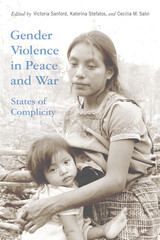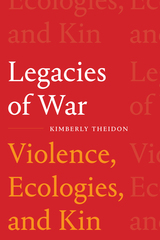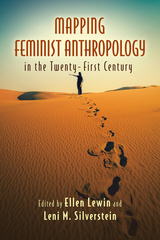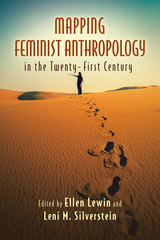5 books about Theidon, Kimberly

Gender Violence in Peace and War
States of Complicity
Sanford, Victoria
Rutgers University Press, 2016
Reports from war zones often note the obscene victimization of women, who are frequently raped, tortured, beaten, and pressed into sexual servitude. Yet this reign of terror against women not only occurs during exceptional moments of social collapse, but during peacetime too. As this powerful book argues, violence against women should be understood as a systemic problem—one for which the state must be held accountable.
The twelve essays in Gender Violence in Peace and War present a continuum of cases where the state enables violence against women—from state-sponsored torture to lax prosecution of sexual assault. Some contributors uncover buried histories of state violence against women throughout the twentieth century, in locations as diverse as Ireland, Indonesia, and Guatemala. Others spotlight ongoing struggles to define the state’s role in preventing gendered violence, from domestic abuse policies in the Russian Federation to anti-trafficking laws in the United States.
Bringing together cutting-edge research from political science, history, gender studies, anthropology, and legal studies, this collection offers a comparative analysis of how the state facilitates, legitimates, and perpetuates gender violence worldwide. The contributors also offer vital insights into how states might adequately protect women’s rights in peacetime, as well as how to intervene when a state declares war on its female citizens.
[more]

How Difficult It Is to Be God
Shining Path’s Politics of War in Peru, 1980–1999
Carlos Iván Degregori; Edited and with an introduction by Steve J. Stern; Translated by Nancy Appelbaum, Joanna Drzewieniecki, Héctor Flores, Eric Hershberg, Judy Rein, Steve J. Stern, and Kimberly Theidon
University of Wisconsin Press, 2012
The revolutionary war launched by Shining Path, a Maoist insurgency, was the most violent upheaval in modern Peru’s history, claiming some 70,000 lives in the 1980s–1990s and drawing widespread international attention. Yet for many observers, Shining Path’s initial successes were a mystery. What explained its cult-like appeal, and what actually happened inside the Andean communities at war?
In How Difficult It Is to Be God, Carlos Iván Degregori—the world’s leading expert on Shining Path and the intellectual architect for Peru’s highly regarded Truth and Reconciliation Commission—elucidates the movement’s dynamics. An anthropologist who witnessed Shining Path’s recruitment of militants in the 1970s, Degregori grounds his findings in deep research and fieldwork. He explains not only the ideology and culture of revolution among the insurgents, but also their capacity to extend their influence to university youths, Indian communities, and competing social and political movements.
Making Degregori’s most important work available to English-language readers for the first time, this translation includes a new introduction by historian Steve J. Stern, who analyzes the author’s achievement, why it matters, and the debates it sparked. For anyone interested in Peru and Latin America’s age of “dirty war,” or in the comparative study of revolutions, Maoism, and human rights, this book will provide arresting new insights.
In How Difficult It Is to Be God, Carlos Iván Degregori—the world’s leading expert on Shining Path and the intellectual architect for Peru’s highly regarded Truth and Reconciliation Commission—elucidates the movement’s dynamics. An anthropologist who witnessed Shining Path’s recruitment of militants in the 1970s, Degregori grounds his findings in deep research and fieldwork. He explains not only the ideology and culture of revolution among the insurgents, but also their capacity to extend their influence to university youths, Indian communities, and competing social and political movements.
Making Degregori’s most important work available to English-language readers for the first time, this translation includes a new introduction by historian Steve J. Stern, who analyzes the author’s achievement, why it matters, and the debates it sparked. For anyone interested in Peru and Latin America’s age of “dirty war,” or in the comparative study of revolutions, Maoism, and human rights, this book will provide arresting new insights.
[more]

Legacies of War
Violence, Ecologies, and Kin
Kimberly Theidon
Duke University Press, 2022
In Legacies of War Kimberly Theidon examines the lives of children born of wartime rape and the experiences of their mothers and communities to offer a gendered theory of harm and repair. Drawing on ethnographic research in postconflict Peru and Colombia, Theidon considers the multiple environments in which conception, pregnancy, and childbirth unfold. She reimagines harm by taking into account the impact of violence on individual people as well as on more-than-human lives, bodies, and ecologies, showing how wartime violence reveals the interdependency of all life. She also critiques policy makers, governments, and humanitarian organizations for their efforts at postconflict justice, which frequently take an anthropocentric rights-based approach that is steeped in liberal legalism. Rethinking the intergenerational reach of war while questioning what counts as sexual and reproductive violence, Theidon calls for an explicitly feminist peace-building and postconflict agenda that includes a full range of sexual and reproductive rights, including access to safe and affordable abortions.
[more]

Mapping Feminist Anthropology in the Twenty-First Century
Lewin, Ellen
Rutgers University Press, 2016
Feminist anthropology emerged in the 1970s as a much-needed corrective to the discipline’s androcentric biases. Far from being a marginalized subfield, it has been at the forefront of developments that have revolutionized not only anthropology, but also a host of other disciplines. This landmark collection of essays provides a contemporary overview of feminist anthropology’s historical and theoretical origins, the transformations it has undergone, and the vital contributions it continues to make to cutting-edge scholarship.
Mapping Feminist Anthropology in the Twenty-First Century brings together a variety of contributors, giving a voice to both younger researchers and pioneering scholars who offer insider perspectives on the field’s foundational moments. Some chapters reveal how the rise of feminist anthropology shaped—and was shaped by—the emergence of fields like women’s studies, black and Latina studies, and LGBTQ studies. Others consider how feminist anthropologists are helping to frame the direction of developing disciplines like masculinity studies, affect theory, and science and technology studies.
Spanning the globe—from India to Canada, from Vietnam to Peru—Mapping Feminist Anthropology in the Twenty-First Century reveals the important role that feminist anthropologists have played in worldwide campaigns against human rights abuses, domestic violence, and environmental degradation. It also celebrates the work they have done closer to home, helping to explode the developed world’s preconceptions about sex, gender, and sexuality.
[more]

Mapping Feminist Anthropology in the Twenty-First Century
Lewin, Ellen
Rutgers University Press, 2016
Feminist anthropology emerged in the 1970s as a much-needed corrective to the discipline’s androcentric biases. Far from being a marginalized subfield, it has been at the forefront of developments that have revolutionized not only anthropology, but also a host of other disciplines. This landmark collection of essays provides a contemporary overview of feminist anthropology’s historical and theoretical origins, the transformations it has undergone, and the vital contributions it continues to make to cutting-edge scholarship.
Mapping Feminist Anthropology in the Twenty-First Century brings together a variety of contributors, giving a voice to both younger researchers and pioneering scholars who offer insider perspectives on the field’s foundational moments. Some chapters reveal how the rise of feminist anthropology shaped—and was shaped by—the emergence of fields like women’s studies, black and Latina studies, and LGBTQ studies. Others consider how feminist anthropologists are helping to frame the direction of developing disciplines like masculinity studies, affect theory, and science and technology studies.
Spanning the globe—from India to Canada, from Vietnam to Peru—Mapping Feminist Anthropology in the Twenty-First Century reveals the important role that feminist anthropologists have played in worldwide campaigns against human rights abuses, domestic violence, and environmental degradation. It also celebrates the work they have done closer to home, helping to explode the developed world’s preconceptions about sex, gender, and sexuality.
[more]
READERS
Browse our collection.
PUBLISHERS
See BiblioVault's publisher services.
STUDENT SERVICES
Files for college accessibility offices.
UChicago Accessibility Resources
home | accessibility | search | about | contact us
BiblioVault ® 2001 - 2024
The University of Chicago Press









